During the 2018 Farm Equipment Manufacturers Assn. (FEMA) Marketing & Distribution Convention in Minneapolis, a panel of farm equipment dealers answered questions from shortline manufacturers. The questions showed how little some of the manufacturers and dealers understand about the others’ business model and how different it is from their own.
Dealers on the panel were: Keith Kreps of RDO Equipment, B.J. Knutson of Titan Machinery, Scott Beach of Grinnell Implement, Jim Wood of Rocky Mountain Equipment and Jay Funke of Del-Clay Farm Equipment. The panel was moderated by Mike Wiles, dealership marketing consultant and regular contributor to Farm Equipment magazine.
“It’s like we've had a really good marriage, but some things have changed in our relationship, and we need counseling,” says Wiles. “We're going to get all our grievances out in the open and make our relationship even better. At least, that's what I'm going for.
“Shortline manufacturers and dealers have had good relationships over the years, but the internet came along, and dealer consolidation came along. We're just going to get the elephant in the room about distribution out, and talk about it.”
Changes in Relationships with Shortline Manufacturers
Wiles: Has your relationship with your shortline manufacturers changed in the last few years?
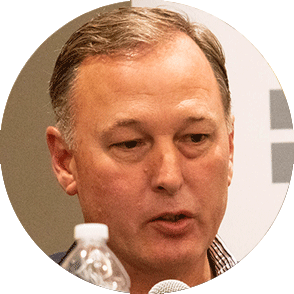
- Mainline: Case IH
- Shortlines: Cub Cadet, Stihl, Land Pride, Westendorf, J&M, Yanmar
- Single store location
Scott Beach: It has changed in that the farm economy has forced us to look at what's making us money and what's not. A dealership like ours has tried to get very lean, and rather than take the risk on something that only sells one item a year, we kind of rely on the shortline manufacturer to have that piece of equipment available so that if we need it in a timely fashion, we can get it.
And sometimes that's a struggle for them, but it takes a little bit of the financial burden off of us, to sell a piece of equipment and store it within our lot. So, that's gotten harder because, on the shortline side of things, they're probably trying to use things they can, too; they don't want to carry that. But for us, it's hard to order something and speculate that you're going to have an opportunity to sell it when you only sell one or two.
If we sell three, four, five things in a year, I don't mind stocking it. But if it's a one or two a year, I'm not going to invest right now.
Jay Funke: We have seen some changes with the frequency of people stopping by our office to give us information on what is going on. It seemed as we were sitting there with our inventory that none of us saw it dropping off as hard as it did. They forgot about us in the field a little bit.
What we are looking for is shortline manufacturers that will support us with their product, with the ability to get it when we need it, and something that we can make some margin in. We are in an area where there's a lot of dealers. You can go 26 miles from Edgewood, Iowa, and you've got 8 dealers.
But, if you put your product in all eight of those dealerships, there's no margin to be made for anybody and it becomes difficult to carry that product.
Number of Dealers Needed/Recommended
Wiles: Do manufacturers just want one person to cover a big area, or do they want multiple dealers in that area? What's your thoughts on how many dealers are in your area?

- Mainlines: Case IH, New Holland
- Shortlines: Geringhof, ATop Air, Yieldtrac
- 50 ag and construction stores in the U.S. and Europe
Jim Wood: When we look at a shortline, I look at something we can take on through the whole complex, not just regions. And of course, we've been consolidating the last 7 years, so as we take on these smaller stores or we look at the shortlines and go for one, can we get exclusivity for our organization.
Second, does it compete with something we already have a good relationship with and just work with the market? If you have 5 dealers set up in that town, I wouldn't even consider it. Because we've seen it over and over where you just bastardize the margins. We have to support that with parts and service and training if we want to do it properly. You can't do it properly when there's no margin in it.
B.J. Knutson: It generally doesn't work for us to be able to get it in our whole footprint, but I do try to avoid just having one of our stores have that particular line. And, to your question, it's very important to us to not have 8 dealers in one town in a race to the bottom.
A lot of our best partnerships and our best relationships have been with the shortlines that we've partnered with that have given us protected territories and a fairly wide swath. There's nothing worse than just selling two of something because if you sell one, you can honestly tell the farmer and your parts and service people can tell you’re the only one that has it.
But the minute you go to two, you better get to some scale. That's why we want those really good partners that we can be really successful with, and generally that goes hand in hand with the protected territories to some degree.
Funke: I'll expound on it from being a single dealership. I've had several companies that we worked with come to me and say, "Are you familiar with another dealer? How do you get along with them?" If I'm looking at a line, I appreciate that question. Because, first off, you need more than one dealer in the area so that you do have parts support. You've got somebody that can answer other questions.
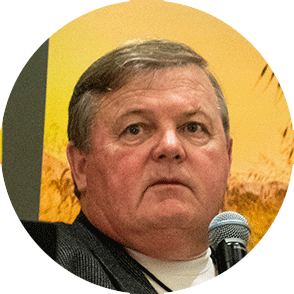
- Mainlines: AGCO, New Holland
- Shortlines: Bobcat, Landoll, Drago, AgLeader, Kawasaki, Penta, H&S
- Single store location
As a single dealership, we may need somebody that is 40, 50 miles away. On a couple of the lines, we have protected territory. They give you the list price, they give you a suggestion not to drop below a certain level and those things are good information for a dealership, because none of us know where we should price it. When we're sitting there paying the interest bill, we want to make sure that we get it moved correctly at a price that allows us, and the manufacturer, to make money.
Keith Kreps: To add to what Jay was saying, whether it's a one store organization or a multiple store organization, bigger isn't better. Better is better, and you’ve got to figure out who you want to partner with. But a lot of times, decisions on who represents what dealers is made at a salesperson level, or at least it appears to us, that that's where the decision is made.
We've had situations where a shortline company has had a route in state, and the state right next door has a different route, and they're setting up small dealers right on the border because this guy doesn't want to lose a commission to somebody on the other side, and do detrimental things to the shortline manufacturer because they're more worried about their commission and what's good for them.
But you certainly need to narrow your dealers and find dealers that truly want to partner with you and want to invest, and whether that's a single store or a multiple store. Having 500 dealers isn't the best thing. Having 100 dealers that really want to represent your product and invest in it is better for you and better for us as a dealer.
Wiles: What do you appreciate the most from a shortline manufacturer?
Funke: Having a knowledgeable sales rep and service rep is key because you can take that product in field and make it work. A lot of times as they come up with a new product, our people are not well enough versed in it and it's very difficult to go online and get all the training. One of the things you talked about this morning, Mike, are the YouTube videos. That's getting to be very important in everything we do.
With the guys on the combines today with the auto-steer, they're on their cellphones. If they want something, they got to run and they're going to the internet to find out. But people that know how to make it work are the most important thing you can do for us.
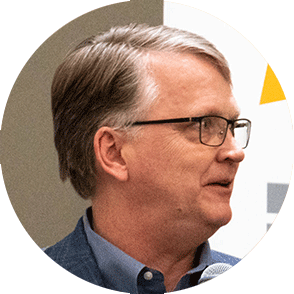
- Mainline: John Deere
- Shortlines: over 150 including Yetter, Northstar Attachments and Unverferth
- 75 stores in 9 states
Wood: What I like about shortlines is your versatility, and you're much quicker to react, maybe change the way you do things. Come to market with a product a lot sooner.
Kreps: We make more money off selling shortline products than we do our mainline products if we have the right manufacturer — the right partner — so it's definitely a great part of our business. But we're looking for a good partner and not somebody looking for a one size fits all solution.
Knutson: I also like somebody who understands our business — inventory turns, return on assets, the capitalization it takes upstairs, what our service expenses are, warranties, the impact on parts warranties, service warranties, parts stocking, parts turns — those types of things.
Somebody that understands our business and the different ROA and profitability that would come with that line. That helps the relationship, when they understand why we might want to throttle down or why we're wanting to ramp up.
Kreps: A couple of our main shortline companies are really good at helping move inventory through the channel. When we've got something another dealer needs, they've got great programs to move that stuff through. When we've acquired some dealers, there's often 2-4-year-old equipment; new equipment sitting on that yard that they've got terms up front and the manufacturer pretty much walked away from it and didn't help them try to move it.
In most cases, unless it's a real strong line, our only defense is to drop that line and use the state laws to have them buy back that equipment because it's sitting there and it's 4 years old. But trying to figure out how to move that equipment and not have it sitting on dealers' yards is really important.
Advice to Shortline Manufacturers
Wiles: What's your one piece of advice for the shortline manufacturers to make you more successful and them more successful?
Wood: Always ensure that however you're going to market, that you've got the right people and you understand who you're doing business with. You're going to do different business with myself than you are going to do with Scott. It's just a bigger scale.
There's so many miscommunications between us and some of the shortlines, because they show up at a branch, the branch manager tells them, "Oh, sorry, corporate won't let us order anything," just to get rid of them, and then they go away to the next one. Everyone's consolidating; dealers are getting bigger. Just understand how you need to deal with this. This is where you're welcome with arms open, if you do build something that our customer wants, we can build that partnership. But just understand how to do business with us.
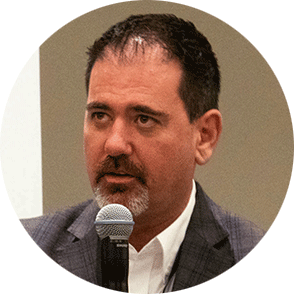
- Mainlines: Case IH, New Holland
- Shortlines: Kubota, Metso, Leeboy, Bourgault, Seed Hawk, MacDon, Claas, SeedSync, CX-6 Smart Seeder
- 37 dealerships across three Canadian provinces
Beach: If folks here can have a representative that treat the dealer's inventory like it's theirs and help when it's getting aged. Some of the more disappointing things with our shortlines is I rarely ever see an aged program. Where if you can't get that machinery moved to another dealer that could utilize it and sell it, come to us and say hey, without saying, but don’t talk about a spiff to help only if we buy more stuff.
Come to me and say, "Hey, this is getting aged. We need to find a home for it. Here's the program that will maybe help you do that." It excites me and our sales staff to say, “Hey, we've got somebody that's going to bat for us,” rather than feeling like we got left out in right field or something like that. I appreciate the opportunity to talk to you.
Funke: Most of us aren’t afraid to pay for our motel room. Give us a nice meal, give us a little round robin talk, and then take that time to go out and meet each one of us.
Knutson: For me it's getting back to you understanding our business and what we're trying to do. A lot of the things that got talked about here, from not having the 8 dealers in one town and protecting parts margins, paying for warranties, and having good products. There are things we can both be successful at.
I’ll add the word “business” in front of relationship. The “business” relationship is most important to me, because I've got some reps that I don't do much business with, that I go drink a lot of beer with. And I've got reps I don't drink much beer with but do a lot of business with.
Our success together and understanding my business is much more important to me than just another relationship or friendship.
Kreps: It's sitting down with your customers, which would be us, the dealer, and really talking, whether it's once a year or every 3 years. What's important to you? How do you want to be served? What could we do better? We tell our people in the field to have those same conversations with our customers. One manufacturer that we do business other than John Deere; we have a regularly scheduled meeting like that.
Everybody else just takes us for granted and is probably doing business the way they did business 5 or 10 years ago. We've had to look at everything we do in our stores and react to today's environment. And if you haven't done that, get a clean sheet of paper and get your team together, and get your dealers together, and start looking at what does it look like, next year and 3 years from now.
Wiles: But you know what they say the No. 1 trait of a salesperson going forward… empathy. Being able to understand where the customer is and help them get a good solution. And I think what the dealers and manufacturers here are saying, we need to walk a mile in everybody else's shoes.
Manufacturers need to know more about what the dealership's going through and vice versa. The way to do that's relationships and communication. And we've all got our struggles. The whole world is not the same as it was.


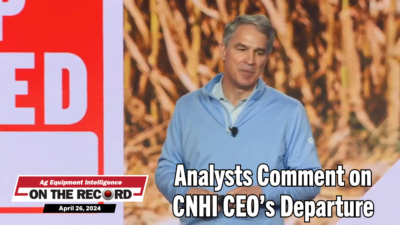



Post a comment
Report Abusive Comment